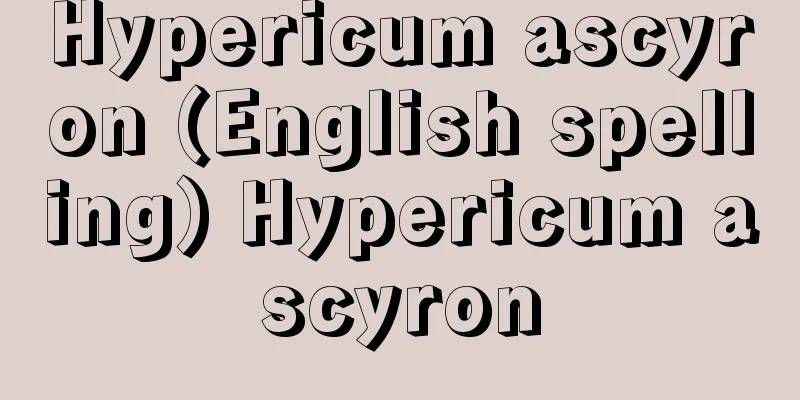Morality - Dotoku (English spelling) Moral

|
Morality is made up of "way" (do) and "virtue," but in this case, "way" refers to the way people should follow in this world, and "virtue" refers to the state of having mastered it. It is a phrase that already exists in Chinese classics, such as the "Book of Changes," which says, "(A sage) is in harmony with morality, understands righteousness, and reaches the end of reason, reaching his true nature, and attains life." Here, morality is also the way of heaven, and it is shown that the principles that humans should follow and the principles of nature are one and the same. Incidentally, the English word "moral" (even in Japan, the word "moral" is often used instead of "morality") comes from the Latin "mores," which originally meant "custom." Focusing on this aspect, morality can be seen as the totality of customary rules that have been established in a particular society that is limited by time and region. Therefore, so-called etiquette and manners are also part of morality. One reason why "morality" is a subject in elementary and junior high schools is probably because of the importance placed on training in such etiquette and manners. According to the 17th century English philosopher Locke, the moral goodness or badness of an act is determined by whether it complies with the law, which is divided into "the law of God," "civil law," and "the law of public opinion" ("the law of custom"). Those who do not obey the law of God will be punished in the afterlife, those who do not obey the civil law will be punished by law, and those who do not obey the law of public opinion will be sanctioned by public condemnation. Locke is talking about morality in a broad sense here, but what is usually called morality is the third law, the law of public opinion, which is distinguished from the second law as law. However, some legal scholars view the law as the "minimum morality" that humans should obey, in which case law would also be included in morality. This kind of customary morality is supported by common sense, as Locke called it the law of public opinion, and in many cases there is no need to reflect on why one should follow it. The American philosopher Dewey therefore distinguished between customary morality and reflective morality. Reflective morality is an autonomous morality based on reflection on moral good and evil, and in some cases it may deny customary morality that is in force. "Morality" and "ethics" are generally used in the same sense, but if a distinction is to be made, it would be appropriate to call the latter, reflective morality, ethics. Ethics is not simply a description of customary morality, but a study that explores the principles of morality from the standpoint of reflective morality. [Yoshiaki Utsunomiya] [References] |Source: Shogakukan Encyclopedia Nipponica About Encyclopedia Nipponica Information | Legend |
|
道徳は「道」と「徳」からなるが、この場合の「道」とは世の中で人が従うべき道のことであり、「徳」とはそれを体得した状態のことである。すでに中国の古典にあることばで、たとえば『易経』のなかに、「(聖人は)道徳に和順して義を理(おさ)め、理を窮(きわ)め性を尽くして以(もっ)て命に至る」という表現がある。ここでは、道徳は天の道でもあって、人間の従うべき理法と自然の理法とが一体であることが示されている。 ところで、道徳にあたる英語moral(日本でも道徳のかわりにモラルという表現がよく用いられる)は「習俗」を原義とするラテン語のmoresに由来する。この側面に注目すれば、道徳とは時代的、地域的に限定された特定の社会において成立している慣習的な掟(おきて)の総体とみることができる。したがって、いわゆる礼儀(エチケット)や作法(マナー)も、道徳の一部である。小・中学校に「道徳」の教科があるのも、一つにはこうした礼儀作法への躾(しつけ)が重視されているからであろう。 17世紀のイギリスの哲学者ロックによると、行為の道徳的善悪は、行為が法に従っているか否かによって決まるが、その法には「神の法」と「市民法」と「世論の法」(「風習の法」)の別がある。神の法に従わない者は来世で罰せられ、市民法に従わない者は法的処罰を、世論の法に従わない者は世間から非難されるという制裁を受ける。ロックはここで広義の道徳について語っているが、普通、道徳とよばれているのは三番目の世論の法であり、二番目の法律としての法から区別される。もっとも法学者のなかには、法(法律)は人間が従うべき「最小限の道徳」であるという見方もあり、この場合には法も道徳のうちに含まれることになる。 こうした慣習としての道徳は、ロックが世論の法とよぶように、世間の常識に支えられており、なぜそれに従わなければならないかといった反省を必要としない場合が多い。そこでアメリカの哲学者デューイは、慣習道徳と反省道徳とを区別した。反省道徳は道徳的善悪についての反省のうえにたった自律的な道徳で、場合によっては通用している慣習道徳を否定することもある。「道徳」と「倫理」はおおむね同じ意味で用いられるが、区別するとすれば、後者の反省道徳を倫理とよぶのが適切であろう。倫理学は、単に慣習道徳を記述するのではなく、反省道徳の立場にたって道徳の原理を探究する学問である。 [宇都宮芳明] [参照項目] |出典 小学館 日本大百科全書(ニッポニカ)日本大百科全書(ニッポニカ)について 情報 | 凡例 |
<<: The Theory of Moral Sentiments
Recommend
《God is Hard》 - God is Hard
...In 1957, the brothers began publishing science...
Stopping direction
The title of a Kyogen piece. Tarokaja Kyogen. The...
Moldy Moss - Moldy Moss
…It is the family with the largest number of gene...
Educational library - Kyoiku toshokan
...Its predecessor was the National Institute for...
Testament - Yuigon
〘Noun〙① Words left behind for afterlife. Igen. Igo...
Yasuda Yojuro - Yasuda Yojuro
Literary critic. Born April 15, 1910 in Nara Pref...
Prague Cathedral - Prague Cathedral (English spelling)
Prague's cathedral. A representative example o...
Cooperative corps - Kyodotai
…During that time, he put his ideas into practice...
Hair sting - Kamizashi
...A type of hair ornament. The origin of the wor...
Evil truth
Burdock seeds. In traditional Chinese medicine, th...
Egocentrism
This refers to a way of cognition and thinking in...
The Rebellion of Yi Yi
In China, in 1262 (3rd year of the Zhongtong era),...
Cynthia cardui
... V . atlanta , found in Europe, is known as th...
Kakitsuki
Military chronicle. 1 volume. Both the author and...
Coptic - Koputogo (English spelling) Coptic
This refers to the final stage of the ancient Egy...









